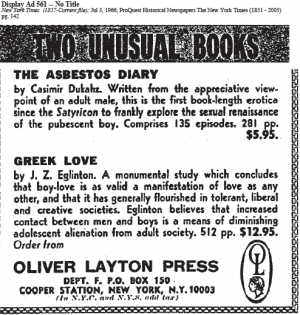One of our staff members is contributing considerably to a News Archiving service at Mu. Any well educated (Masters, PhD or above) users who wish to make comments on news sites, please contact Jim Burton directly rather than using this list, and we can work on maximising view count.
Greek Love
- For the practise of man-boy love, according to the traditions of Ancient Greece, see Pederasty.

Greek Love (ISBN 1589636376) is a book written by Walter Breen (under his J.Z. Eglinton pseudonym), most probably with scholarly support from Warren Johansson (both late), on the subjects of modern and historical Pederasty.
In the book, Breen attempts to distinguish between adult-adolescent and adult-child relationships, characterising the latter as meaningless and lacking in virtue. Given the recent acceptance of a uniformly adult-adult gay relationship model, this exercise in line-drawing may seem somewhat odd to the modern reader.
Contents

I. Theory and Practice
1. Objectives
2. Some common Objections Answered [See Debate Guide for similar material]
3. Greek Love as a Social Problem
4. Greek Love as a Solution to a Social Problem
5. The Theory and Practice of Love
6. Sexual Aspects of Greek Love
7. Some uncomplicated Greek Love Affairs [Relevant to Accounts and Testimonies]
8. Some Difficult Greek Love Affairs [Relevant to Accounts and Testimonies]
II. History and Literature
9. Historical Synopsis
10. Boy-love in Ancient Greece
11. Boy-love in Ancient Rome
12. Boy-love in the Middle Ages
13. Boy-love in the Renaissance
14. Boy-love in the Restoration, Enlightement, Romantic Period
15. Boy-love in the 19th Century
16. The 20th Century -- Divergent Traditions
Postscript by Dr. Albert Ellis
Rebuttal by J. Z. Eglinton
Commentary
- "Greek Love is the first literary, historical, psychological and sociological study of boy-love ever to appear.
- Up to now, specialists in sexology have been either too confused to say anything of relevance, or too scared to commit it to print! Such authorities as Stekel, Krafft-Ebing, Bergler, George W. Henry, Ulrichs, Carpenter, Haverlock Ellis, and Freud managed to write volumes about other sexual practices, but they betrayed no real understanding of what makes a man love a boy.
- The author of Greek Love believes that boy-love is a potential social force for good. In Ancient Greece, it was closely bound up with the highest ethical and philosophical ideals. Therefore, we must seriously consider the possibility that boy-love can be a forece for good right now, in our own country.
- Greek Love is refreshing to read. The author does not affect the modern pseudo-objectivity that is so often a coverup for moral vacillation. Though he treats the subject fairly, he makes no attempt to conceal his pro-sexual orientation."
External links
- Find at Archive.org, libgen or through Research Resources - Information Freedom Companions if inaccessible. See review.